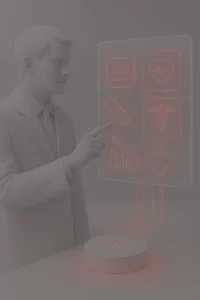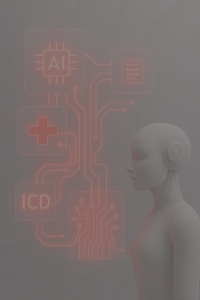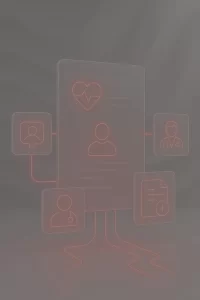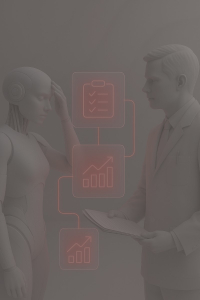Clinical Notes AI Solution
Transform Documentation Management with Intelligent Text Recognition
Healthcare organizations struggle with massive volumes of legacy paper records and unstructured clinical documentation that create information gaps, compliance risks, and operational inefficiencies. Our clinical notes AI solution offers a revolutionary approach to document digitization and analysis, enhancing information accessibility, improving compliance management, and unlocking valuable insights from previously inaccessible clinical narratives.
Use Cases for Clinical Notes AI in Healthcare
Legacy Record Digitization
Unlock historical patient data. Our clinical notes AI solution rapidly converts paper charts and legacy records into fully searchable digital documents with structured data extraction for integration with current EHR systems.
Referral Document Processing
Streamline information transfer. The system automatically processes incoming referral packets—extracting relevant clinical information, reconciling it with existing records, and highlighting critical elements requiring provider attention.
Research and Population Health
Accelerate clinical insights. Our AI clinical notes solution enables analysis of unstructured documentation across patient populations—identifying patterns, trends, and correlations that support research and quality improvement initiatives.
Revenue Cycle Enhancement
Capture overlooked reimbursement opportunities. The system identifies billable services, documentation gaps, and coding opportunities within clinical narratives—improving financial performance while maintaining compliance.
Regulatory Submission Support
Simplify administrative requirements. Our solution automates the extraction and compilation of clinical documentation required for quality reporting, credentialing, accreditation, and other regulatory submissions.
Start Transforming Your Clinical Documentation Today
Schedule your free documentation assessment
Key Benefits of Clinical Notes AI Solution
Enhanced Information Accessibility
Eliminate information silos. Our clinical notes AI transforms inaccessible paper records and legacy documents into searchable digital resources, allowing providers to access complete patient histories regardless of original documentation format.
Improved Clinical Decision Support
Enable informed care decisions. Our solution extracts and highlights critical clinical information from unstructured notes, identifying diagnoses, medications, allergies, and care plans that might otherwise remain buried in lengthy narrative text.
Streamlined Compliance Management
Reduce regulatory exposure. The AI system automatically identifies protected health information, tracks disclosure requirements, and maintains comprehensive audit trails, thereby simplifying compliance with HIPAA, retention policies, and legal discovery requests.
Operational Efficiency
Eliminate manual processing. Our clinical notes AI solution automates document sorting, classification, data extraction, and routing—reducing administrative overhead while accelerating information flow throughout your organization.
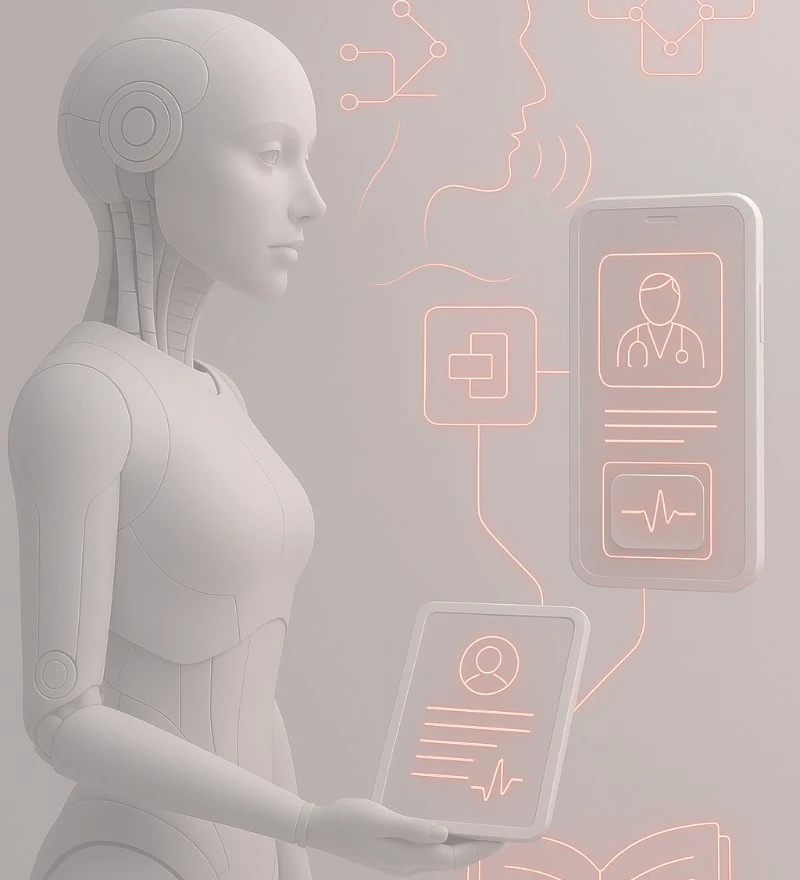
5 Steps To Implement Clinical Notes AI Solution In Just 6-10 Weeks
Let’s Transform Your Clinical Documentation
See what an AI clinical notes solution can do for your organization
COMPLIANCE
WITH HEALTHCARE STANDARDS








Our Other Healthcare Software Services
Healthcare AI solutions
We build AI-boosted healthcare products from scratch, empowering your existing software with AI capabilities, augmenting your internal AI experts team, and more.
Interoperability solutions
Leverage our expertise in cross-platform healthcare data interoperability, FHIR/HL7 integrations with Epic and other EHRs, SMART on FHIR development, healthcare data analytics on FHIR, and data conversion to FHIR.
Cloud services
We support healthcare organizations with cloud infrastructure security audits, optimization, automation, and maintenance. We will help you migrate heavy legacy software to the cloud.
Healthcare Data Analytics
We transform your scattered data into strategic clarity. Clinical data analysis, insights, operational, workflow optimization, patient engagement, behavior analytics, AI-driven decision support, and more.
FAQ AboutSPsoft Clinical Notes AI Solution
How accurate is the OCR and information extraction for clinical documents?
Our clinical notes AI solution achieves exceptional accuracy through healthcare-specific training and continuous refinement. For standard typewritten clinical documents, our base OCR accuracy exceeds 99% at the character level, with structured data extraction accuracy typically ranging from 95% to 98%, depending on the document’s complexity. For handwritten notes, accuracy ranges from 85-95%, with continuous improvement through machine learning feedback loops. Our healthcare-specific models are trained to recognize medical terminology, abbreviations, and clinical shorthand that generic optical character recognition (OCR) systems often misinterpret. The system employs context-aware processing that validates extracted information against expected clinical patterns and relationships. For mission-critical data points, the solution includes configurable human verification workflows to ensure 100% accuracy where required. We provide comprehensive accuracy reporting and continuous quality monitoring to ensure optimal performance throughout the solution lifecycle.
How does the system handle diverse document types and formats?
Our AI clinical notes solution excels at processing the diverse range of document formats commonly encountered in healthcare environments. The system automatically identifies and applies appropriate processing algorithms for different document types—from structured forms and semi-structured lab reports to completely unstructured narrative notes. For each document type, the AI employs specialized extraction rules that recognize characteristic layouts, terminology patterns, and data relationships. The solution includes template recognition capabilities that automatically identify standard document formats from referring providers, hospitals, and labs, applying consistent extraction rules to similar documents over time. For irregular or unfamiliar formats, the system employs more generalized NLP approaches to identify key clinical concepts, regardless of the presentation format. This flexible approach ensures consistent information extraction across your entire document ecosystem, regardless of source or structure.
How do you ensure patient privacy and data security?
Privacy and security are foundational elements in our clinical notes AI system. We implement comprehensive safeguards, including advanced PHI detection with automated redaction capabilities when required, role-based access controls with fine-grained permissions, end-to-end encryption of all document data both at rest and in transit, and detailed audit logging of all system interactions and document accesses. Our AI models run within your secured environment or compliant cloud infrastructure, eliminating data transmission to external processing systems. The solution includes configurable retention policies that ensure your specific compliance requirements are met for managing documents. We provide comprehensive security documentation to support your risk assessment and compliance efforts, including alignment with the HIPAA Security Rule and mapping to the HITRUST framework. Our implementation process includes a thorough security evaluation to ensure the solution integrates seamlessly with your existing security controls.
How does the system integrate with our existing EHR and document management systems?
Our clinical notes AI solution is designed for seamless integration with your healthcare IT ecosystem. We support multiple integration methods, including HL7, FHIR, API-based connections, and direct database integration where appropriate. For EHR integration, the system can surface extracted information directly within the patient record, attach processed documents with structured data overlays, or populate discrete data fields based on extracted content. For document management systems, we offer bi-directional integration that enables AI processing of incoming documents while maintaining your established storage and retention workflows. Our technical team collaborates closely with your IT department to determine the optimal integration approach tailored to your specific systems, technical environment, and clinical workflows. Most implementations achieve full integration within 4 to 6 weeks, with minimal disruption to existing operations.
Can the system handle specialty-specific terminology and documentation patterns?
Absolutely. Our clinical notes AI solution includes specialized models for different clinical specialties, each incorporating the unique terminology, abbreviations, and documentation patterns relevant to that field. The system recognizes specialty-specific clinical concepts—from the fracture classifications in orthopedics to the mental status examination elements in psychiatry. During implementation, we configure and optimize the system to suit your organization’s specialty mix, ensuring that each clinical department receives appropriate processing. For organizations with highly specialized documentation requirements, we offer custom model enhancements that utilize your historical documents further to refine recognition accuracy for unique terminology and formats. This specialty-aware approach ensures consistent high performance across your entire clinical enterprise, regardless of departmental documentation practices.
What is the typical ROI and timeframe for implementing a clinical notes AI solution?
Organizations that implement our AI clinical notes solution typically achieve a significant return on investment across multiple dimensions. Most see 60-80% reductions in manual document processing costs within the first three months after implementation. Information accessibility improvements typically lead to 15-25% reductions in duplicate testing and redundant imaging as providers gain access to previously inaccessible historical data. Revenue improvements of 3-8% are common through better charge capture and documentation completeness. Compliance-related savings from improved information governance typically offset 15-40% of implementation costs annually. When considering these combined financial benefits alongside clinical quality improvements, most organizations achieve a complete return on investment (ROI) within 6 to 12 months of implementation. Our team provides comprehensive impact analysis during the assessment phase to project your specific expected returns based on your organization’s unique characteristics and documentation volumes.
